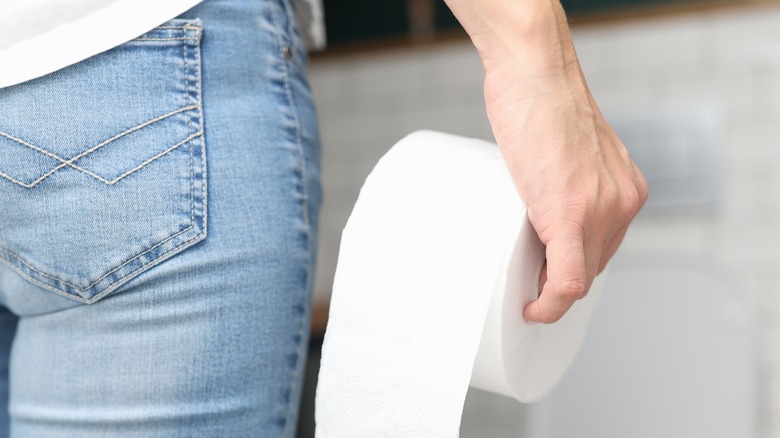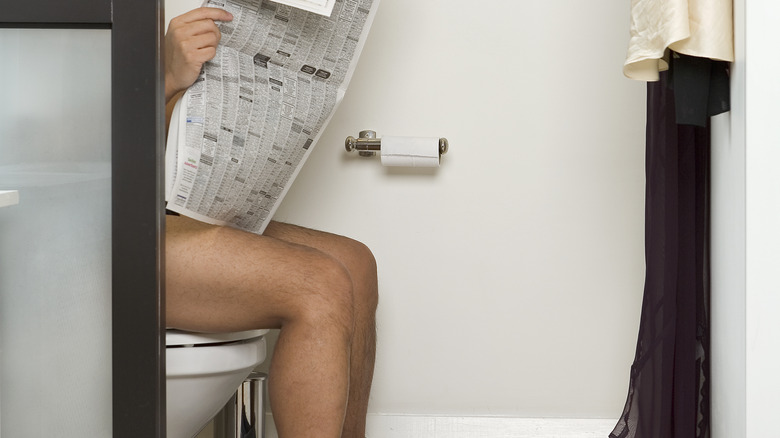Why We Can't Poop Without Peeing
Pooping and peeing are everyday things we probably don't think much of since the day our parents made a huge fuss when we first went to the bathroom by ourselves as kids. Since that joyous childhood memory, we've experienced changes in poop and pee habits and consumed unexpected ingredients that make you poop instantly. However, unless any of these were related to health conditions, it's unlikely that they took up a lot of space in your head. With that said, there are some poop- and pee-related phenomena that puzzle us even as adults, like what it means when pooping gives you the chills. (Spoiler alert: It has something to do with your nerves.)
But have you ever wondered why you can, more often than not, pee without finding the need to poop, but the reverse is not necessarily true? You know what we're talking about. Perhaps it's become such a normal thing to have some urine dribble out during or after a poop that you have to try and isolate that memory, but we know you've wondered about it at one point or another. As it turns out, it's because of what happens when you relax your anal sphincter when compared with what transpires when you relax your urinary sphincter. Let's explain.
Relaxing your anal muscles also relaxes your urinary muscles
Defecating and urinating are both functions that are controlled by ring-shaped muscles called sphincters. When your sphincters get the signal from your brain to relax, you are able to urinate or pass stool.
As explained by NHS surgeon Dr. Karan Rangarajan (via YouTube), the urinary sphincter is smaller and weaker when compared to the anal sphincter, and this has an effect on why you pee while pooping but rarely ever poop while peeing. "When you urinate, you can easily isolate the smaller and weaker external sphincters around the urethra without relaxing the entire pelvic floor or the anal sphincters," explained the doctor. This is why you can urinate without feeling the need to have a bowel movement.
However, when you poop and your external anal sphincters relax, because they're much stronger and larger, they end up decreasing some tension in the urinary sphincters too, shared Dr. Rangarajan. "So you can pee whilst you poo." On a side note, did you know that controlling those muscles is something we learn as we age, after being toddlers with involuntary reflexes? As you grow and mature, you are able to hold your poop till you find a bathroom or hold in your pee till you make it home while on a commute. Speaking of holding in urine and stool, this is not recommended by experts and has health consequences, especially when done frequently.
Your pee and poop functions are more connected than you think
Your urinary system and bowel movements are connected in a few ways. This is why when a child (or adult) experiences constipation, they might pee more frequently and even have other urinary problems like straining to pee, etc. "If a person is chronically constipated, and the rectum is very full and dilated, it can put pressure on the bladder and increase a person's urinary frequency," explained gastroenterologist Dr. Niket Sonpal (via Well+Good).
Additionally, the nerves that control your bowel function are also involved in the urination process. Some of these nerves include the spinal cord, the cauda equina (which facilitates sensation and movement to lower parts of your body), the pudendal nerves (involved in peeing and pooping), and the enteric nervous system. This is why an injury or impairment in any of these areas may result in fecal incontinence or lack of bladder control. Now that you're aware of how pooping and peeing are intrinsically related, you may want to learn about another fascinating yet amusing thing that happens in regard to your bowel movements: the weird reason you have the need to poop while shopping.

